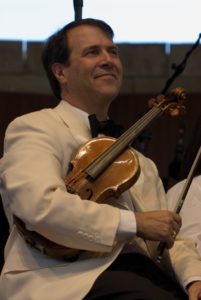Press the Play icon to begin streaming the audio, or right-click the text link and choose Save As or Save Link (Control-Click if you have a Mac).
Right-click to download the MP3 file (36 minutes – 16 MB)

(Photo by Michele Schwartz)
A few weeks ago, I was introduced to a man named Jeremy Constant, who’d just made the first flight on an experimental airplane he’d built himself. “You know, he’s also the first violinist of the San Francisco symphony,” a man sitting next to me said, as the builder/pilot walked away.
It took a moment for that one to sink in. And even then, I didn’t believe it until I checked with Jeremy himself. What on earth, I wondered, would the first violinist of the San Francisco symphony be doing in a world so distant from the sophistication of Davies Symphony Hall?
In part, my disbelief was the result of a visceral understanding of the work and time involved. Building your own airplane, like building your own house, boat, business, or any other creative and painstaking pursuit, is an impressive achievement. So is being talented and dedicated enough to become the first violinist (actually, assistant concertmaster, Jeremy corrected me later) of one of the leading symphony orchestras in the world.
But accomplishing both of those feats, given how much passion, dedication, time and effort each one of them requires, is kind of amazing. Aviation and music are also very different worlds. It’s not like being a carpenter and building furniture in your spare time. How does someone from such an intense and high center of the music world find himself not only learning to be a pilot, but building his own airplane, as well?
Is there some link that’s not obvious between the worlds? Is there some drive that leads to both ends? Does one passion feed the other, or require the other for balance? Or are there simply those people who are attracted to passionate pursuits, no matter how separate those pursuits might be?
In search of answers to those questions, I tracked Jeremy down, and we spent three delightful hours talking about music, flight, passion, and how to find balance and fulfillment in a life path. I think it’s well worth taking a half hour to enjoy the excerpts of the interview I’ve included here.
A few of the many intriguing points Jeremy makes:
- Exposure matters, in terms of finding a passion. His parents believed music lessons were part of a good education. That exposure led him to discover a talent for and love of violin playing
- A passion doesn’t have to be uncompromising. He realized, while at the Julliard School of Music, that the emphasis on a solo career was counter-productive to a fulfilling and much more likely career as a symphony violinist. (Kind of like realizing it’s okay to be a successful professional writer without writing the “Great American Novel.)
- And tied to that thought … that happiness can be largely a matter of expectation. Many successful symphony musicians he knows, Jeremy says, have wonderful careers, but feel unhappy because they’re not a famous soloist, which Jeremy says is a real shame.
- Fame isn’t everything. The conductor of the local community orchestra Jeremy played in as a teenager in Waterloo, Ontario could have made a career a globe-trotting guest conductor in more glamorous locales. But, Jeremy relates, the conductor shrugged and said, “anybody can be a globe-trotting guest conductor. To build a community orchestra in a place where there wasn’t one before … now that’s something.”
- Passion, while a critical component to a creative career, is not enough to sustain it over several decades. The challenges change, Jeremy says. And to stay sharp over time requires a deep sense of commitment and responsibility to your profession and the group as a whole as much as a continuing love of music at the core.
- Passion also needs balance to stay healthy. Even as a world-class violinist, it’s easy to become disgruntled with the particulars and burn-out of an intense career and road. Flying, he says, was a necessary outlet to give him an important sense of control, freedom, and perspective he didn’t get by staying solely in the music world. It also allowed him a way to define himself beyond his identity as a violinist – an increasingly important ability as time has gone by, and the risk of career-ending injuries has grown.
There’s all that and more in this fascinating conversation with Jeremy Constant—assistant concertmaster of the San Francisco Symphony, concertmaster of the Marin County Symphony, concertmaster of the Sun Valley Summer Symphony … and proud owner/builder/pilot of a brand-new Van’s RV-7a aircraft.
Photo by Michele Schwartz






I live in the same town that Jeremy grew up in, and started my musical career in that same town just after he did. Jeremy was always someone the young musicians of our time looked up to and every once in a while I’d wonder about what happened to him. I’m glad to hear that he found his muse, as I found mine. And for the record, the ‘community’ orchestra has grown to be a fully professional orchestra that rivals any of the of the big names.
A big thank you to Jeremy & Lane for having put the very important role of musicians who have deliberately chosen or prefer not to be in the spotlight, into perspective.
It was only after a particularly devastating bout with stage fright, that I decided enough was enough. I decided to quit doing solo work as I simply did not enjoy it. I now concentrate on what I do really enjoy, and that is the music and creating balance within my section. Years later I am still happily playing in KWCO and Wellington Winds.
Realistically speaking, the current music teaching system tries to make everyone into soloists. Unfortunately creates huge sense of regret and dissatisfaction with many younger players and it takes a long time for those feelings to go away or settle with many of us.
As Jeremy points out… it is OK to not be the soloist. While Jeremy has certainly risen through the ranks, I can see that this premise still holds true for him. While the role of the soloist/1st chair is important, the role of the supporting musicians is equally important to the quality of a performance.